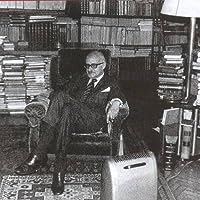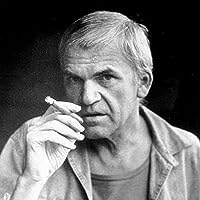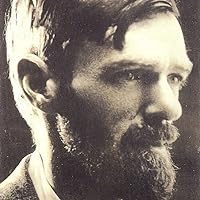Modernism Quotes
Quotes tagged as "modernism"
Showing 151-180 of 246

“The two terms of the democratic alternative today—oppressive bureaucracy or repugnant plutocracy—are canceling each other out.
Combining into a single term: opulent bureaucracy.
At once repugnant and oppressive.”
― Escolios a una texto implícito: Selección
Combining into a single term: opulent bureaucracy.
At once repugnant and oppressive.”
― Escolios a una texto implícito: Selección

“The feudal ownership of land did bring dignity, whereas the modern ownership of movables is reducing us again to a nomadic horde. We are reverting to the civilisation of luggage, and historians of the future will note how the middle classes accreted possessions without taking root in the earth, and may find in this the secret of their imaginative poverty. The Schlegels were certainly the poorer for the loss of Wickham Place. It had helped to balance their lives, and almost to counsel them. Nor is their ground-landlord spiritually the richer. He has built flats on its site, his motor-cars grow swifter, his exposures of Socialism more trenchant. But he has spilt the precious distillation of the years, and no chemistry of his can give it back to society again.”
― Howards End
― Howards End

“Even before the First World War there was a strain in European art and music – in Germany more than anywhere – that was turning from ripeness to over-ripeness and then into something else. The last strains of the Austro-German Romantic tradition – exemplified by Gustav Mahler, Richard Strauss and Gustav Klimt – seemed almost to have destroyed itself by reaching a pitch of ripeness from which nothing could follow other than complete breakdown. It was not just that their subject matter was so death-obsessed, but that the tradition felt as though it could not be stretched any further or innovated any more without snapping. And so it snapped: in modernism and then post-modernism.”
― The Strange Death of Europe: Immigration, Identity, Islam
― The Strange Death of Europe: Immigration, Identity, Islam

“It was then that Brown took his revenge upon the world which, after twenty years of contemptuous and reckless bullying, refused him the tribute of a common robber’s success. It was an act of cold-blooded ferocity, and it consoled him on his deathbed like a memory of an indomitable defiance. . . . Thus Brown balanced his account with the evil fortune. Notice that even in this awful outbreak there is a superiority as of a man who carries right—the abstract thing—within the envelope of his common desires. It was not a vulgar and treacherous massacre; it was a lesson, a retribution—a demonstration of some obscure and awful attribute of our nature which, I am afraid, is not so very far under the surface as we like to think.”
― Lord Jim
― Lord Jim

“The sense of modernism is often seen in the determination of each of the arts to come as close as possible to its own particular nature, its essence. For instance, lyric poetry rejected anything rhetorical, didactic, embellishing, so as to set flowing the pure fount of poetic fantasy. Painting renounced its documentary, mimetic function, whatever might be expressed by some other medium (for instance, photography). And the novel? It too refuses to exist as illustration of a historical era, as description of society, as defense of an ideology, and instead puts itself exclusively at the service of “what only the novel can say.”
― The Curtain: An Essay in Seven Parts
― The Curtain: An Essay in Seven Parts

“If every life is unique, let's live uniquely. Let's reject everything that is not fresh and new. It is necessary to be absolutely modern.”
― Life is Elsewhere
― Life is Elsewhere

“Bizim için muasırlaşmak demek, Avrupalılar gibi otomobiller, tayyareler yapıp kullanabilmek demektir, muasırlaşmak şekilce ve maişetçe Avrupalılara benzemek değildir.”
― Türkleşmek, İslamlaşmak, Muasırlaşmak
― Türkleşmek, İslamlaşmak, Muasırlaşmak

“I believe that modernism itself is based on an error, an error in the understanding of who man is, an error in under- standing the nature of reality both metacosmic and cosmic. Modernism is based on an enormous deception, which is leading us to perdition and destroying the world.”
― در جستوجوی امر قدسي
― در جستوجوی امر قدسي

“What I meant was that in the old days, it was the Holy Ghost, le saint esprit in French, in whom the Christians believed, claiming that it provided guidance and protection for the Church and Christian life. Now, they have taken out le saint esprit and they have put in its place instead l’esprit du temps, the spirit of the times, which in a sense is now our master. We are in a deep sense slaves to this ‘‘spirit.’’ We have absolutized time, although this is philosophically absurd, and now we search how we should accommodate ourselves and even our religion to this way of thinking. I am totally opposed to this point of view, and I have stood like a firm tree against a storm during over fifty years of writing on this sub- ject. I have stood for the principle that it is we who must make the times in accordance with our sacred traditions.”
― در جستوجوی امر قدسي
― در جستوجوی امر قدسي

“They say: 'We are all lame in the face of the truth. Once upon a time there was an authoritative teaching in the Church; now we are all seeking; this is the era of pluralism in the faith.' But the faith is not pluralist: a healthy pluralism may be allowed in theology, in the Liturgy, in other things, but never in the faith. Once it is established that God has revealed a truth, the answer is yes, for everyone, in every age: a yes with conviction and courage, without doubts or hesitations. And the idea that the truths of the faith are only a momentary expression of the conscience and life of the Church must be rejected with every strength. These truths are always valid even if it is always possible to understand them better and to express them with new formulas, clearer and more suited to the new times.”
― Illustrissimi: Letters from Pope John Paul I
― Illustrissimi: Letters from Pope John Paul I

“ঐ নিয়ন্তা হাতটির ইশারায়
বসেছি তখন সে-তটে
মৎস্য-শিকারে রত, পশ্চাতে বিরান তেপান্তর
আমার জমি কি নেব না গুছিয়ে আমি অন্ততঃ?
লন্ডন ব্রিজ ভেঙে প’ড়ে যায় ভেঙে প’ড়ে যায় ভেঙে প’ড়ে যায়
সে সেই অনলে লুকাল তাদের পুড়ে যা করবে শুদ্ধ অতঃপর
কবহুঁ ভইব দোয়েল-সমান—দোয়েল দোয়েল বোনটি
ভাঙা কেলায় আকিতেইনের রাজার কুমার কাঁদে
প্রলয় আমার ঠেকিয়েছি এই খোলামকুচির বাঁধে
তথাস্তু, হবে ব্যবস্থা তব। খেপেছে হিয়েরোনিমো পুনরায়।
দত্ত। দয়ধ্বম্। দাম্যত।
শান্তিঃ শান্তিঃ শান্তিঃ”
― The Masterpieces of World Literature: 150 Books You Should Read Before You Die: Romeo and Juliet, Emma, Vanity Fair, Middlemarch, Tom Sawyer, Faust, Notre Dame de Paris, Dubliners, Odyssey
বসেছি তখন সে-তটে
মৎস্য-শিকারে রত, পশ্চাতে বিরান তেপান্তর
আমার জমি কি নেব না গুছিয়ে আমি অন্ততঃ?
লন্ডন ব্রিজ ভেঙে প’ড়ে যায় ভেঙে প’ড়ে যায় ভেঙে প’ড়ে যায়
সে সেই অনলে লুকাল তাদের পুড়ে যা করবে শুদ্ধ অতঃপর
কবহুঁ ভইব দোয়েল-সমান—দোয়েল দোয়েল বোনটি
ভাঙা কেলায় আকিতেইনের রাজার কুমার কাঁদে
প্রলয় আমার ঠেকিয়েছি এই খোলামকুচির বাঁধে
তথাস্তু, হবে ব্যবস্থা তব। খেপেছে হিয়েরোনিমো পুনরায়।
দত্ত। দয়ধ্বম্। দাম্যত।
শান্তিঃ শান্তিঃ শান্তিঃ”
― The Masterpieces of World Literature: 150 Books You Should Read Before You Die: Romeo and Juliet, Emma, Vanity Fair, Middlemarch, Tom Sawyer, Faust, Notre Dame de Paris, Dubliners, Odyssey

“Lutheran ideology unleashed libido to achieve its political and ecclesial ends, and Luther, like Hugh Hefner, discovered that the only way to make use of libido effectively was to create for his contemporaries an escape from the guilt that accompanied its satisfaction. The sixteenth-century equivalent of the Playboy Philosophy was justification by faith alone, culminating in the doctrine of the enslaved will. De Servo Arbitrio, it should be remembered, was published in the same year that Luther married. Luther, in creating his doctrine of the enslaved will, became the first modern man, and Lutheranism became the first modern ideology. Its primary attraction to the hordes of apostate priests and nuns who flocked to Wittenberg to follow him lay in its ability to rationalize sexual license and broken vows.”
― Degenerate Moderns: Modernity As Rationalized Sexual Misbehavior
― Degenerate Moderns: Modernity As Rationalized Sexual Misbehavior

“Religion? 'tis as naught to us, our contempt for it grows the better acquainted with it we become; allies... kin... friends... judges? there's none of that in this place, dear girl, you will discover nothing but cruelty, egoism, and the most sustained debauchery and impiety.”
― Justine, or The Misfortunes of Virtue
― Justine, or The Misfortunes of Virtue
“These ideas fit the experience of these Japanese women who often talked about searching for or trying to develop "self" (jibun). Cultivating or polishing self by doing tea ceremony or being a good mother, for example, had a good connotation for the Japanese because it meant that you were trying to go beyond your narrow self and connect self with the larger world beyond social norms. But developing self in the new way these women used it meant to develop self according to just what you want to do or in a way that enhances your own possibilities in the world. Would others see choosing a life for self as selfish? These women had to maintain some ambiguity because they were wandering into dangerous territory when they wanted to travel just to enjoy themselves, or keep working and not marry. In a society that honored the cultivation of a larger self, would they themselves someday suffer for having chosen the self-centered way?”
― Dilemmas of Adulthood: Japanese Women and the Nuances of Long-Term Resistance
― Dilemmas of Adulthood: Japanese Women and the Nuances of Long-Term Resistance

“We have become so preoccupied in clicking, capturing and caging memories that we have forgotten to live them first.”
― Coffee and Ordinary Life
― Coffee and Ordinary Life
“Knowing that you betrayed me, I know you will betray me, but I don't love you with the kind of love that can be betrayed”
―
―

“Yes, each religion has to provide instructions for its followers as to how to live in our present- day world. But to take this change itself as the ‘‘principle’’ which should drive us on, as if we were picked up like a horse and driven against our will, that is not only against religion, but also against everything for which the Western ideas of liberty and freedom have stood.”
― در جستوجوی امر قدسي
― در جستوجوی امر قدسي
“The Love Song of J. Alfred Prufrock,” whatever else it might be, seems to be an investigation into the possibility of durational being, which Bergson had described as “the form which the succession of our conscious states assumes when our ego lets itself live, when it refrains from separating its present state from its former states.” The succession that Bergson opposes to vitality is the realm in which the morbid Prufrock tries to imagine speaking Andrew Marvell’s line, “Now let us sport us while we may,” but then falls back on his indecision, his failure to pose his overwhelming question, and his inability to sing his love. Prufrock’s problems are shown to be symptoms of the form of time in which desire for youth runs defiantly against the remorselessness of aging, snapping the present in two. The “silent seas” that might bring relief from currents and countercurrents of time turn out to be like the troubling one that figures in Hamlet’s overwhelming question: “To be or not to be: that is the question: / Whether ’tis nobler in the mind to suffer / The slings and arrows of outrageous fortune, / Or to take arms against a sea of troubles / And by opposing end them.” Prufrock understands but is unable to admit the ontological force of the question: the “whips and scorns of time” that threaten to reverse all his “decisions and revisions” make him wish to be merely “a pair of ragged claws / Scuttling across the floors of silent seas.” That synecdochic figure is as much an anachronous peripeteia for Prufrock as it is for Polonius when Hamlet taunts him: “you yourself, sir, should be as old as I am if, like a crab, you could go backwards.”
―
―
“Bergson considered poetry to be born of intuition, and words that were “at first, only signals” are thus converted into instruments of art. Russian modernists treat words in much the same way”
―
―
“Bergson's emphasis on the importance of art for the clear seeing of reality paralleled the modernist call for new modes of artistic perception and expression”
―
―
“Termed variously as "secularization," "religious disenchantment" or "modernism," this movement has given rise to an essentially new form of consciousness. It has construed knowledge as empirically demonstrable facts; it has subordinated ethics and aesthetics to what works or is workable; it has reduced intimacy to sexuality and inflated sexuality to fetishism. It has come to see faith as belief or a belief system and, in what passes for tolerance or "understanding," maintains a dogmatic attitude of relativism regarding the truth or appropriateness of all such "systems of belief.”
―
―

“In the reality of the modernism, modern technology, science, and other skills, why should I think and believe that justice and love are still blind?”
―
―

“Miserabilism leads to a mixture of indifference towards the past and hatred of it. This hatred is visible in the architecture and urban planning of Europe since the war. [...] This mania for destruction, often carried out in lesser degrees by the strategic placement of a terrible building that the eye cannot escape (the Tour Montparnasse in Paris is a particularly fine example of the genre), is a symptom of an impotent rage that Europe has been left behind, is not longer in the vanguard of anything. It is also a kind of magical thinking: that by adopting the externals of modernity somehow modernity itself will be achieved and mastered.”
― The New Vichy Syndrome: Why European Intellectuals Surrender to Barbarism
― The New Vichy Syndrome: Why European Intellectuals Surrender to Barbarism

“Today, many Christians are no longer even aware of the basic teachings of the Faith, so there is a growing danger of missing the path to eternal life. However, it remains the very purpose of the Church to lead humanity to Jesus Christ, the light of the nations. In this situation, the question of orientation arises.”
― Manifesto of Faith
― Manifesto of Faith

“Many wonder today what purpose the Church still has in its existence, when even bishops prefer to be politicians rather than to proclaim the Gospel as teachers of the Faith. The role of the Church must not be watered down by trivialities, but its proper place must be addressed. Every human being has an immortal soul, which in death is separated from the body, hoping for the resurrection of the dead (CCC 366).”
― Manifesto of Faith
― Manifesto of Faith

“The experience of beauty guides us along this second path: it tells us that we are at home in the world, that the world is already ordered in our perceptions as a place fit for the lives of beings like us. But—and this is again one of the messages of the early modernists—beings like us become at home in the world only by acknowledging our ‘fallen’ condition, as Eliot acknowledged it in The Waste Land. Hence the experience of beauty also points us beyond this world, to a ‘kingdom of ends’ in which our immortal longings and our desire for perfection are finally answered. As Plato and Kant both saw, therefore, the feeling for beauty is proximate to the religious frame of mind, arising from a humble sense of living with imperfections, while aspiring towards the highest unity with the transcendental.”
― Beauty
― Beauty
“If miracles are to be common, everyday occurances, normal and not extraordinary, they cease to attract attention, and lose their very reason of existence. What is normal is according to law. If miracles are the law of the Christian life they cease to serve their chief end.
The contention of the faith-healers overlooks numerous important Biblical facts. Primarily the fact that the miraculous gifts in the New Testament were the credentials of the apostles, and were confirmed to those to whom the apostles had conveyed them--whence a presumption arises against their continuance after the apostolic age. ... Paul did not share the views of our modern faith-healers.”
― Counterfeit miracles
The contention of the faith-healers overlooks numerous important Biblical facts. Primarily the fact that the miraculous gifts in the New Testament were the credentials of the apostles, and were confirmed to those to whom the apostles had conveyed them--whence a presumption arises against their continuance after the apostolic age. ... Paul did not share the views of our modern faith-healers.”
― Counterfeit miracles
All Quotes
|
My Quotes
|
Add A Quote
Browse By Tag
- Love Quotes 97k
- Life Quotes 75.5k
- Inspirational Quotes 72.5k
- Humor Quotes 43.5k
- Philosophy Quotes 29.5k
- Inspirational Quotes Quotes 27k
- God Quotes 26k
- Truth Quotes 23.5k
- Wisdom Quotes 23.5k
- Romance Quotes 23k
- Poetry Quotes 22k
- Death Quotes 20k
- Happiness Quotes 18.5k
- Life Lessons Quotes 18.5k
- Hope Quotes 18k
- Faith Quotes 18k
- Quotes Quotes 16.5k
- Inspiration Quotes 16.5k
- Spirituality Quotes 15k
- Religion Quotes 15k
- Motivational Quotes 15k
- Writing Quotes 14.5k
- Relationships Quotes 14.5k
- Life Quotes Quotes 14k
- Love Quotes Quotes 13.5k
- Success Quotes 13.5k
- Time Quotes 12.5k
- Motivation Quotes 12k
- Science Quotes 11.5k
- Knowledge Quotes 11k



